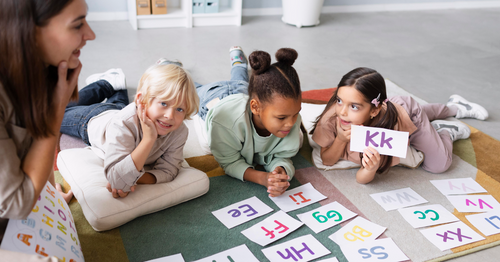Reviewing material is an integral part of the learning process, especially in ESL education. As students progress in their language journey, reinforcing previously learned concepts helps solidify their understanding and retention. To make this review process enjoyable and effective, incorporating interactive activities and games into ESL classrooms is paramount. We've prepared a few tasks that will help you enhance English teaching to your students.
Importance of Review in ESL Learning
Regular review sessions serve multiple purposes in ESL education:
- Consolidation of Knowledge: Revisiting previously covered material helps students reinforce their understanding and retention of language concepts.
- Building Confidence: Review sessions offer students the opportunity to showcase what they've learned, boosting their confidence in using English.
- Active Engagement: Interactive review activities make learning fun and engaging, encouraging active participation among students.
- Identifying Gaps: Review sessions help teachers identify areas where students may need additional support or clarification.
Review Games and Activities for ESL
ESL Surveys

Surveys are the best ESL review activity there is; they are interactive, cover a wide range of skills, and can be used for almost any topic. In addition, they require students to get up from their seats and interact with their classmates, which is a great way to liven up a dull class. Lastly, surveys are ideal for encouraging students to use WH questions as a follow-up.
A-Z Alphabet Game
It is perfect for teaching colors, for example, and is one of the best ESL review games that can be used for almost any topic. Students have to think of a word in a certain category for each letter of the alphabet. It is a great way to wrap up a class or review vocabulary from previous classes as a quick warm-up.
Ball Toss ESL Review Game
A fun ESL review exercise that can liven up a classroom is Ball Toss. There are a lot of variations, but the basic idea is that students write words or questions on a beach ball, then take turns tossing the ball around the room and using their right thumb (or any other finger) to answer the question or form a sentence.
Mystery Box Interactive Review Game

The Mystery Box is a great teaching review game for elementary school students. It works well with basic classroom objects and adjectives (hard, soft, big, small, etc.). Students have to reach into a box of objects and then describe what they feel with words.
Skills: Speaking
Time: 5-10 minutes
Age: All ages
Materials: Several small objects, a box
How to do the Mystery Box Activity?
Have students feel inside the box one at a time, asking them questions about its size, shape, texture, etc. After they have all had a turn, go over the answers they provided and ask them to guess what is inside. If they guess correctly, pull items out of the box; if not, show the items to the class. You can use anything (not sharp), but letter magnets and children's toys work well for this.
Typhoon
This entertaining game for all ages is a great way to evaluate just about anything! Check it out here:
Dictation Practice
Having your students complete dictation is a great review exercise for almost anything. It is primarily focused on writing and listening skills, but it also covers spelling, grammar, and vocabulary quite a bit, so give it a try! One of the best things about dictation is that it works well for both one student and a class of 100.
The Flyswatter Game
Playing the flyswatter game is a great way to review almost anything because it pits students against one another to slap the correct word or phrase on the whiteboard in response to a clue you provide. It works especially well for reviewing basic grammar or new vocabulary.
Skills: Listening/Reading
Time: 5-10 minutes
Age: 7+
Materials: Whiteboard, 2 flyswatters
Procedure
1. Divide students into two teams.
2. Write 10-20 vocabulary words on the whiteboard randomly.
3. The first two students come to the board and are each given a flyswatter.
4. The teacher gives hints for one of the words, starting with general ones and getting more specific. I usually aim for about 3 hints before the first student will guess the word. Make it fun by going general at the start with students have a few options.
Conclusion
Integrating regular review sessions into ESL education significantly contributes to students' language acquisition and retention. These sessions not only reinforce learned material but also foster confidence, active engagement, and identification of areas needing further support. Incorporating interactive games like surveys, the A-Z Alphabet Game, Ball Toss, Mystery Box, Typhoon, dictation practices, and the Flyswatter Game adds an enjoyable dimension to the learning process while effectively reinforcing language concepts. These diverse activities cater to various learning styles and abilities, making the review process both enriching and enjoyable for ESL students, thereby enhancing their overall language learning experience.









